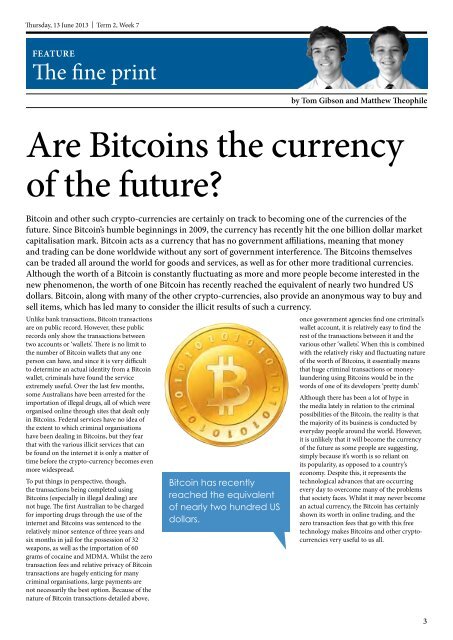View Here - Cranbrook School
View Here - Cranbrook School
View Here - Cranbrook School
You also want an ePaper? Increase the reach of your titles
YUMPU automatically turns print PDFs into web optimized ePapers that Google loves.
Thursday, 13 June 2013 | Term 2, Week 7<br />
FEATURE<br />
The fine print<br />
by Tom Gibson and Matthew Theophile<br />
Are Bitcoins the currency<br />
of the future<br />
Bitcoin and other such crypto-currencies are certainly on track to becoming one of the currencies of the<br />
future. Since Bitcoin’s humble beginnings in 2009, the currency has recently hit the one billion dollar market<br />
capitalisation mark. Bitcoin acts as a currency that has no government affiliations, meaning that money<br />
and trading can be done worldwide without any sort of government interference. The Bitcoins themselves<br />
can be traded all around the world for goods and services, as well as for other more traditional currencies.<br />
Although the worth of a Bitcoin is constantly fluctuating as more and more people become interested in the<br />
new phenomenon, the worth of one Bitcoin has recently reached the equivalent of nearly two hundred US<br />
dollars. Bitcoin, along with many of the other crypto-currencies, also provide an anonymous way to buy and<br />
sell items, which has led many to consider the illicit results of such a currency.<br />
Unlike bank transactions, Bitcoin transactions<br />
are on public record. However, these public<br />
records only show the transactions between<br />
two accounts or ‘wallets’. There is no limit to<br />
the number of Bitcoin wallets that any one<br />
person can have, and since it is very difficult<br />
to determine an actual identity from a Bitcoin<br />
wallet, criminals have found the service<br />
extremely useful. Over the last few months,<br />
some Australians have been arrested for the<br />
importation of illegal drugs, all of which were<br />
organised online through sites that dealt only<br />
in Bitcoins. Federal services have no idea of<br />
the extent to which criminal organisations<br />
have been dealing in Bitcoins, but they fear<br />
that with the various illicit services that can<br />
be found on the internet it is only a matter of<br />
time before the crypto-currency becomes even<br />
more widespread.<br />
To put things in perspective, though,<br />
the transactions being completed using<br />
Bitcoins (especially in illegal dealing) are<br />
not huge. The first Australian to be charged<br />
for importing drugs through the use of the<br />
internet and Bitcoins was sentenced to the<br />
relatively minor sentence of three years and<br />
six months in jail for the possession of 32<br />
weapons, as well as the importation of 60<br />
grams of cocaine and MDMA. Whilst the zero<br />
transaction fees and relative privacy of Bitcoin<br />
transactions are hugely enticing for many<br />
criminal organisations, large payments are<br />
not necessarily the best option. Because of the<br />
nature of Bitcoin transactions detailed above,<br />
Bitcoin has recently<br />
reached the equivalent<br />
of nearly two hundred US<br />
dollars.<br />
once government agencies find one criminal’s<br />
wallet account, it is relatively easy to find the<br />
rest of the transactions between it and the<br />
various other ‘wallets’. When this is combined<br />
with the relatively risky and fluctuating nature<br />
of the worth of Bitcoins, it essentially means<br />
that huge criminal transactions or moneylaundering<br />
using Bitcoins would be in the<br />
words of one of its developers ‘pretty dumb.’<br />
Although there has been a lot of hype in<br />
the media lately in relation to the criminal<br />
possibilities of the Bitcoin, the reality is that<br />
the majority of its business is conducted by<br />
everyday people around the world. However,<br />
it is unlikely that it will become the currency<br />
of the future as some people are suggesting,<br />
simply because it’s worth is so reliant on<br />
its popularity, as opposed to a country’s<br />
economy. Despite this, it represents the<br />
technological advances that are occurring<br />
every day to overcome many of the problems<br />
that society faces. Whilst it may never become<br />
an actual currency, the Bitcoin has certainly<br />
shown its worth in online trading, and the<br />
zero transaction fees that go with this free<br />
technology makes Bitcoins and other cryptocurrencies<br />
very useful to us all.<br />
3
















